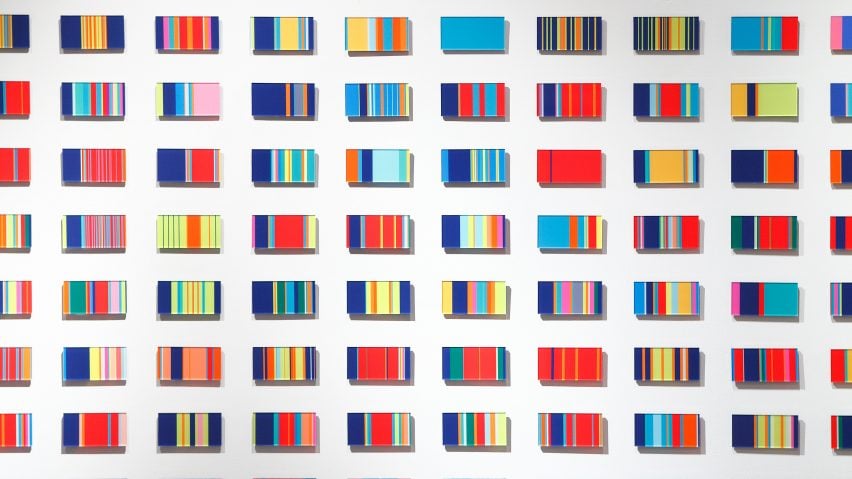The founders of Japanese creative studio Spread reveal how they use colour as the primary medium in their work and explain how their Life Stripe project seeks to find pattern in the everyday in this interview as part of our VDF x Alcova collaboration.
Spread was founded in 2004 by Haruna Yamada and Hirokazu Kobayashi, who had previously worked in landscape design and graphic design, respectively. The studio's work ranges from branding and advertising to art installations and exhibitions.
The design duo uses bright colours, inspired by the founders' honeymoon in South Africa, as large-scale elements in space. "The sunlight there was so bright, the colours so strong – we felt the power created by light," they said of their South African safari.
Spread is also informed by people like "Christo and Jean-Claude or Oliviero Toscano, who integrated design and art into the social," said the founders, who have created a number of works that use colour as abstract sensory communication that cuts across cultural and language barriers.
Among these is Life Stripe, which uses bands of colour to find patterns in our everyday existence.
"By recording one’s everyday actions—sleeping, dining, relaxing, working, and so on—using a palette of 21 different colours, each person experiences a form of therapy by looking at their life and the patterns within it; in that way, each person can preserve their memory, connect to their present, and cultivate their imagination all at the same time," Spread explained.
Yamada and Kobayashi spoke to Italian design platform Alcova, where their Life Stripe project was to be shown during Salone del Mobile, before the furniture fair was cancelled, about Spread's work and how design attempts to create the future.
VDF x Alcova
Exhibitor: Spread
Website: www.spread-web.jp
Email: contact@spread-web.jp
Alcova: How did colour become the primary medium in your work?
Spread: Fifteen years ago, we visited South Africa and went on safari during our honeymoon. The sunlight there was so bright, the colours so strong—we felt the power created by light. Meanwhile, when we were students in Niigata, three hours north of Tokyo, the city was covered in snow through the winter months, an all-white flat landscape that was suddenly altered by the appearance of cherry blossoms in spring, and turned entirely green in summer. After our studies, we worked in the cosmetics industry, where the red of lipstick is not just any red, where colour is used to inspire passion and perceptions of beauty.
Spread: Colour became our primary field of experimentation, although it was always central to our design disciplines in advertising graphics and urbanism. In setting up our studio, we wanted to bring together the rapid process of graphic design with the long-term project of landscape design. We were also inspired by figures like Christo and Jean-Claude or Oliviero Toscano, who integrated design and art into the social.
Alcova: What is the role of design in inspiring change?
Spread: Design attempts to create the future, but it is difficult to explore the future because it does not yet exist. We can only create the doorway to the future as an imagined projection. The past, on the other hand, is something we can explore freely—not necessarily as historical information, but as an experience through all five senses. When we start new projects, we extract ideas and sensations from our past experiences in travel. When we exhibited at Alcova last year, we felt a strong sense of history in the old industrial setting, while the wild vegetation and trees growing in the gaps represented to us the future. Old and new coexisted in this space, which was a perfect environment for our projects to be encountered by visitors.
Alcova: This year, you are presenting Life Stripe through Alcova in the Virtual Design Festival. What is the concept behind Life Stripe, and how does it fit into your overall studio business?
Spread: When a person travels, they meet other people and learn more about themselves through the essential variations of human activity performed all around the world. In Life Stripe, colour is used to represent daily life as a journey. By recording one’s everyday actions—sleeping, dining, relaxing, working, and so on—using a palette of 21 different colours, each person experiences a form of therapy by looking at their life and the patterns within it; in that way, each person can preserve their memory, connect to their present, and cultivate their imagination all at the same time. As part of a growing Life Stripe collection, each person can recognise the importance of their individual life amidst the lives of others, the value of the personal perspective amidst the global view.
Spread: Before COVID-19, many people left home to go to work for almost the entire day—often from 8AM to midnight in Japan. Now, we are redrawing the boundaries between work and domesticity, leisure and rest. We are forced to confront ourselves closely in a moment of stillness. In order to change, we must first gain knowledge of ourselves and each other. After COVID-19, we can feel the significance of life more deeply. Even in this moment of immobility, information travels and emotions continue to unfold. We have already started a research on how people’s lives have changed after the virus came into our world. Life Stripe is not motivated by any expectations of profit. It is a 15-year project of growth and communication with people, a way of continuing to travel in other people's lives as well as in our own.
Virtual Design Festival is the world's first online design festival, taking place on Dezeen from 15 April to 10 July 2020.
Alcova is a Milan-based platform established by Italian practices Space Caviar and Studio Vedèt, which champions independent design through a programme of exhibitions. The team consists of Valentina Ciuffi, Joseph Grima, Martina Muzi, Tamar Shafrir and Marco De Amicis.
The VDF x Alcova collaboration presents interviews with eight studios that were set to be featured at the platform's presentation during Salone del Mobile this year.

